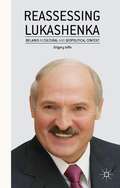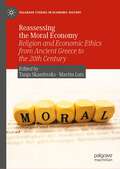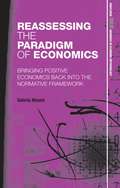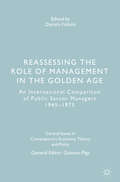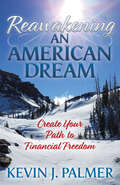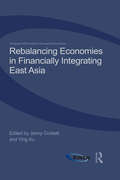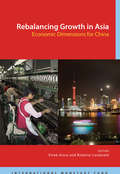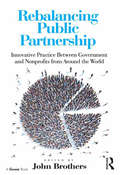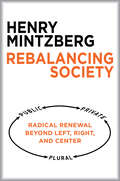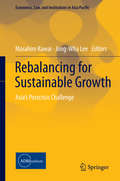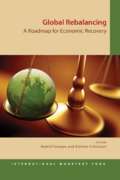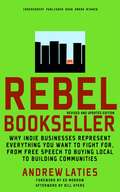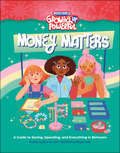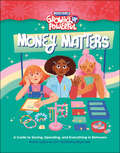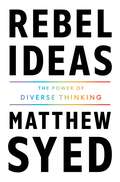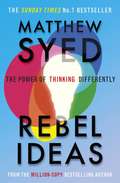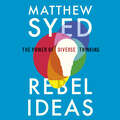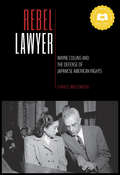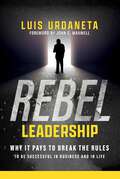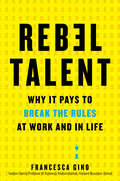- Table View
- List View
Reassertion of Control over the Investment Treaty Regime
by Andreas KulickDriven by public opinion in host states, contracting parties to investment agreements are pursuing many avenues in order to curb a system that is being perceived - correctly or not - as having run out of control. Reassertion of Control over the Investment Treaty Regime is the first book of its kind to examine the many issues of procedure, substantive law, and policy which arise from this trend. From procedural aspects such as frivolous claims mechanisms, the establishment of appeals mechanism or state-state arbitration, to substantive issues such as joint interpretations, treaty termination or detailed definitions of standards of protection, the book identifies and discusses the main means by which states do or may reassert their control over the interpretation and application of investment treaties. Each chapter tackles one of these avenues and evaluates its potential to serve as an instrument in states' reassertion of control.
Reassessing Lukashenka
by Grigory IoffeWho is Mr Lukashenka? Do Belarusians support him out of fear and/or because they are blinkered, or there are other factors that help to explain his longevity as a national leader? The book seeks answers to these questions on the premise that Lukashenka's rule ought to be viewed in the context to which it truly belongs, that is, the context of Belarusian history and identity, not as a form of government (dictatorship) deceitfully imposed on an allegedly benighted people whom better positioned and informed outsiders seek to enlighten and liberate. The author makes use of two extensive personal interviews with President Lukashenka. They present a truly unique body of primary data. Many personal traits of Belarus's president are on full display in the interviews. Anybody willing to come up with his/her opinion about Lukashenka, not necessarily in line with that of the author of this book, can use this material.
Reassessing the Moral Economy: Religion and Economic Ethics from Ancient Greece to the 20th Century (Palgrave Studies in Economic History)
by Tanja Skambraks Martin LutzThis book examines the concept of moral economy originally established by E.P. Thompson, focusing on the impact of religious norms on economic practice. With each chapter discussing a different empirical case study, the interrelations of the economy and religion are explored from antiquity through to the 20th century. The long-term trajectory and comparative perspective allows for moral economy to be seen in relation to ancient Greek commerce, medieval pawn-broking, Christian and Jewish economic ethics, urban social politics during the Plague, the Jesuit mission in Paraguay, the Ottoman Empire, religion in modern American capitalism, and Catholic attitudes toward taxation.This book aims to provide insight into how moral thinking about the economy and economic practice has evolved from a long historic perspective. It will be relevant to students and researchers interested in economic history and cultural economics.
Reassessing the Paradigm of Economics: Bringing Positive Economics Back into the Normative Framework (Routledge Inem Advances In Economic Methodology Ser. #12)
by Valeria MosiniWhen President Reagan and Prime Minister Thatcher adopted the neoliberal doctrine as the paradigm of economics, there was no evidence that the move would have been successful, but thirty years on, the recurrent crises that culminated in 2008 suggest a serious mis-match between expectations and outcomes: a re-examination of the paradigm is in order. This book focuses on Milton Friedman’s formulation of the neoliberal doctrine, and analyses two aspects that were essential to turning it into a fully-fledged paradigm: the attribution of scientific status to positive economics, which led to informing public policies on the requirements of the market; and the characterisation of economic freedom as capable of promoting political freedom, which led to identifying free market with democracy. The book exposes Friedman’s methodological argument for attributing positive economics scientific status as a failure, and his characterisation of economic freedom as a delusion; it identifies in the emergence as the mainstream in economics of the neoclassical synthesis, which borrowed from Walras’ the mathematical treatment of equilibrium but not the ethical and social framework in which it was inscribed, a development that facilitated the transition from the Keynesian to the neoliberal paradigm. Dr. Mosini shows that the gigantic bail-outs carried out courtesy of the public purse, which institutionalised the practice of collectivising losses while keeping profits private, were no accident, but the consequence of the rethinking of the function of lender of last resort according to Friedman’s conception of rationality in relation to risk, combined with his interpretation of the 1930s recession. The book concludes that the neoliberal paradigm has served the interests of the economically powerful social strata it was designed to benefit extremely well, but that the deep, and deepening, injustice it has brought about calls for a complete rethinking of the paradigm of economics according to ethical principles respectful of human values. This book should be of interest to students and researchers of Political Economy, Economic Methodology, History of Economic Thought and Philosophy.
Reassessing the Role of Management in the Golden Age
by Daniela FelisiniThis book provides a critical reassessment of the role of the public sector during the Golden Age in both advanced and emerging economies. Contributions focus on a major player in the setting of mixed economies: the top managers of state-owned enterprises. Bringing together world-renowned scholars, this collection analyzes the actions of these managers and their contribution to the rise and fall of the mixed economy during the Golden Age, opening up a comparative perspective of the topic. The book forces readers to reconsider how crucial state-owned enterprises were for economic recovery and for the modernization of the production apparatus of many countries in Western Europe, India, Latin America and South Africa. Key chapters discuss state-owned enterprises in twentieth-century Europe, the managerial revolution in Italy, the role of the state in Argentine industrialization, and the organization of capital in the Indian economy. This insightful collection will appeal to scholars and students with an interest in economic history and the socio-economic impact of state-owned companies around the globe.
Reawakening an American Dream: Creating Your Path to Financial Freedom
by Kevin J PalmerReawakening an American Dream reveals the hidden secrets first-time millionaires have used to gain abundance or achieve financial freedom.
Reawakening the Magic: Bob Iger and the Walt Disney Company
by David J. Collis Ashley HartmanMickey Mouse, Snow White, and Buzz Lightyear strolled down Main Street at the grand opening of Hong Kong Disney in the Fall of 2005, pausing to snap selfies with enthusiastic children in their Mickey Mouse ears. Bob Iger, newly appointed CEO of The Walt Disney Company proudly watched the parade go by, but concerned for the future of the global corporation, he turned to colleagues and asked, "How many characters in this parade were created by Disney in the last ten years?" There was one. But the languishing Disney animation department was not the company's only problem. Disney was under pressure: the company had recently delivered poor financial results; ratings at the ABC network had fallen below competitors; Walt's nephew, Roy E. Disney, had stepped down from the Board after expressing his displeasure with the direction of the company under Iger's predecessor, Michael Eisner; and Comcast had made a $54 billion hostile bid to take over Disney only one year before. The situation for Disney looked bleak. Yet by December 2015 the tide had turned (Exhibit 1). The much-anticipated Star Wars: The Force Awakens was set to become the highest grossing film ever in the U.S. and earn over $2 billion worldwide. Frozen had just surpassed $1 billion in box office to become Disney animation's biggest success ever. In live action movies, Disney franchises, like Pirates of the Caribbean and Marvel's Iron Man, had produced multiple blockbuster hits. ESPN, ABC and other cable and broadcast properties were producing record profits. Attendance was up at Disney parks and cruise ships, while the Shanghai Disney Resort, the company's third and largest theme park in Asia, was scheduled to open in June 2016. Iger thought back to the Hong Kong Disney parade, reflecting on how far the company had come and the lessons he had learned about reawakening the Disney magic.
Reawakening the Magic: Bob Iger and the Walt Disney Company
by David J. Collis Ashley HartmanMickey Mouse, Snow White, and Buzz Lightyear strolled down Main Street at the grand opening of Hong Kong Disney in the Fall of 2005, pausing to snap selfies with enthusiastic children in their Mickey Mouse ears. Bob Iger, newly appointed CEO of The Walt Disney Company proudly watched the parade go by, but concerned for the future of the global corporation, he turned to colleagues and asked, "How many characters in this parade were created by Disney in the last ten years?" There was one. But the languishing Disney animation department was not the company's only problem. Disney was under pressure: the company had recently delivered poor financial results; ratings at the ABC network had fallen below competitors; Walt's nephew, Roy E. Disney, had stepped down from the Board after expressing his displeasure with the direction of the company under Iger's predecessor, Michael Eisner; and Comcast had made a $54 billion hostile bid to take over Disney only one year before. The situation for Disney looked bleak. Yet by December 2015 the tide had turned (Exhibit 1). The much-anticipated Star Wars: The Force Awakens was set to become the highest grossing film ever in the U.S. and earn over $2 billion worldwide. Frozen had just surpassed $1 billion in box office to become Disney animation's biggest success ever. In live action movies, Disney franchises, like Pirates of the Caribbean and Marvel's Iron Man, had produced multiple blockbuster hits. ESPN, ABC and other cable and broadcast properties were producing record profits. Attendance was up at Disney parks and cruise ships, while the Shanghai Disney Resort, the company's third and largest theme park in Asia, was scheduled to open in June 2016. Iger thought back to the Hong Kong Disney parade, reflecting on how far the company had come and the lessons he had learned about reawakening the Disney magic.
Rebalancing Economies in Financially Integrating East Asia (Routledge-ERIA Studies in Development Economics)
by Jenny Corbett Ying XuSince the Asian Financial Crisis (AFC) of 1997–98 large current account surpluses have accumulated in the countries of Asia and the Pacific with corresponding deficits elsewhere. The sharp plunge in global trade volumes during the global financial crisis has highlighted the need for ‘rebalancing’–focussing more on domestic sources of economic growth than on exports in some Asian economies. One key objective of the book is to elucidate the economic structures and policies that give rise to current account surpluses and imbalances and consider what policy adjustments could change them. Another objective is to show the link between financial systems, financial integration and the transmission of economic shocks between countries. The book offers new dimensions to understand ‘rebalancing’ and provides alternative and arguably more fundamental solutions to address imbalances. Rather than focusing on exchange rate misalignment, this book begins from the premise that the imbalances are a macroeconomic problem that reflects a mismatch between savings and investment in the surplus countries. Then, it examines exchange rate policies adopted by countries in the region and finds that part of the explanation for their currency strategy lies in their perceived need to build foreign exchange reserves to provide a buffer in case of instabilities. The book examines whether there are other possibilities for countries to insure against economic volatility by more actively and openly engaging with international capital markets. The studies show that closer financial integration, involving more open financial markets, with well-chosen partners, would be welfare-improving and should reduce the need for the counter-productive, self-insurance policies that result in foreign exchange accumulation.
Rebalancing Growth in Asia: Economic Dimensions for China
by International Monetary FundWith external demand for products decreased due to the recent economic crisis, the main way for Asian countries to maintain their rate of economic growth is to increase internal consumption. Focusing in particular on China, where private consumption makes up the smallest percentage of gross domestic product (GDP), this volume explores ways of increasing household consumption along with the possible employment consequences. Levels of personal and corporate saving are also considered, along with investment patterns. To better illustrate the data, tables and graphs regularly appear. The authors and editors all hold various positions at the International Monetary Fund (IMF). Annotation ©2011 Book News, Inc. , Portland, OR (booknews. com)
Rebalancing Public Partnership: Innovative Practice Between Government and Nonprofits from Around the World
by John BrothersIn the US, as in many other Western economies, federal and state government is working to become more involved with the nonprofit sector; a sector in which many of the organizations are singularly ill-prepared and strategically unaligned to fulfill the new role that is being asked of them. Based on his original research, John Brothers brings together leading thought leaders from the United States and around the world by exploring the prevailing attitudes and perceptions of the nonprofit sector towards government and vice versa and provides advice and direction to help both sides of the equation towards effective collaborative working. The main themes cover the nature and implications of regulatory reform on the sector and how non-government organizations should reengineer their practices. There are also chapters on some of the hot button areas of government contracting and political advocacy. The text includes best-practice examples, case studies as well as tools and templates from across the sectors. Both sides of this emerging partnership need fast-track education on each other’s capabilities, constraints and working practice. Dr Brothers’ contributors provide some very valuable perspectives and insights that should inform and direct this process.
Rebalancing Society: Radical Renewal Beyond Left, Right, and Center
by Henry MintzbergEnough of the imbalance that is causing the degradation of our environment, the demise of our democracies, and the denigration of ourselves. Enough of the pendulum politics of left and right and paralysis in the political center. We require an unprecedented form of radical renewal. In this book Henry Mintzberg offers a new understanding of the root of our current crisis and a strategy for restoring the balance so vital to the survival of our progeny and our planet.With the collapse of the communist regimes of Eastern Europe, Western pundits declared that capitalism had triumphed. They were wrong—balance triumphed. A healthy society balances a public sector of respected governments, a private sector of responsible businesses, and a plural sector of robust communities. Communism collapsed under the weight of its overbearing public sector. Now the “liberal democracies” are threatened—socially, politically, even economically—by the unchecked excesses of the private sector.Radical renewal will have to begin in the plural sector, which alone has the inclination and the independence to challenge unacceptable practices and develop better ones. Too many governments have been co-opted by the private sector. And corporate social responsibility can't compensate for the corporate social irresponsibility we see around us “They” won't do it. We shall have to do it, each of us and all of us, not as passive “human resources,” but as resourceful human beings.Tom Paine wrote in 1776, “We have it in our power to begin the world over again.” He was right then. Can we be right again now? Can we afford not to be?
Rebalancing for Sustainable Growth
by Jong-Wha Lee Masahiro KawaiThe Asian model of export-led growth served it well in the post-war period, but prolonged sluggish growth of the developed economies following the global financial crisis, together with growing inequality and rising environmental problems, point to the need for a new growth model. The purpose of this book is to describe the challenges facing Asian economies in the post-global financial crisis environment and to identify structural issues and policies that can help guide Asian policymakers to expand the growth potential of domestic and regional demand in coming years, and thereby create a basis for balanced, sustainable, and inclusive long-term growth. These issues and policies span a variety of dimensions, including macroeconomic policy (monetary, fiscal, and foreign currency management), real sector issues (trade and industrial structure), infrastructure development, labor market and social policy, financial sector reform and regulation, and regional cooperation and architecture. Key recommendations to achieve these goals include measures to: deepen social protection to support social resilience; increase infrastructure investment to create a "seamless Asia"; enhance productivity in the services sector; establish a region-wide free trade agreement to encourage intraregional trade in goods and services and investment through economies of scale and dynamic efficiency of a larger market; promote a shift to a low-carbon society and support green growth; and deepen and integrate financial markets to facilitate the recycling of Asia's high savings for investment within the region.
Rebalancing: A Roadmap for Economic Recovery
by Hamid Faruqee Krishna SrinivasanThis book examines imbalances in seven major economies: China, France, Germany, India, Japan, the United Kingdom, and the United States, evaluating key indicators agreed on by the G20 for identifying large imbalances, including public and private debt and private saving, and countries' external position. The chapters describe a suite of corrective steps tailored for each country that, if implemented, could improve prospective economic outcomes, creating sustainable and balanced growth for these economies. and serving as a model for other G20 countries.
Rebecca S. Halstead: Steadfast Leadership
by Boris Groysberg Deborah BellReviews Rebecca Halstead's career history, detailing how, through her personal attributes, skills, experiences, challenges, and organizational practices she developed into a successful leader and commander in the U.S. Army. The case profiles her leadership style and philosophy. It examines her career strategies and rise through the ranks; strategies she used to deal with challenges faced as a woman in the military; how she turned around a troubled military unit; and how she dealt with a difficult boss who threatened her command of a 25,000 person combat mission.
Rebecca S. Halstead: Steadfast Leadership
by Boris Groysberg Deborah BellReviews Rebecca Halstead's career history, detailing how, through her personal attributes, skills, experiences, challenges, and organizational practices she developed into a successful leader and commander in the U.S. Army. The case profiles her leadership style and philosophy. It examines her career strategies and rise through the ranks; strategies she used to deal with challenges faced as a woman in the military; how she turned around a troubled military unit; and how she dealt with a difficult boss who threatened her command of a 25,000 person combat mission.
Rebel Bookseller (Second Edition): Why Indie Bookstores Represent Everything You Want to Fight for from Free Speech to Buying Local to Building Communities
by Bill Ayers Andrew Laties Ed MorrowThe revival of independent bookselling has already begun and is one of the amazing stories of our times. Bookseller Andy Laties wrote the first edition of Rebel Bookseller six years ago, hoping it would spark a movement. Now, with this second edition, Laties's book can be a rallying cry for everyone who wants to better understand how the rise of the big bookstore chains led irrevocably to their decline, and how even in the face of electronic readers from three of America's largest and most successful companies--Apple, Amazon, and Google--the movement to support locally owned independent stores, especially bookstores, is on the rise. From the mid-1980s to the present, Andy Laties has been an independent bookseller, starting out in Chicago, teaching along the way at the American Booksellers Association, and finally running the bookshop at the Eric Carle Museum in Amherst, Massachusetts. His innovations were adapted by Barnes & Noble, Zany Brainy, and scores of independent stores. In Rebel Bookseller, Laties tells how he got started, how he kept going, and why he believes independent bookselling has a great future. He alternates his narrative with short anecdotes, interludes between the chapters that give his credo as a bookseller. Along the way, he explains the growth of the chains, and throws in a treasure trove of tips for anyone who is considering opening up a bookstore. Rebel Bookseller is a must read for those in the book biz, a testament to the ingeniousness of one man man's story of making a life out of his passionate commitment to books and bookselling.
Rebel Girls Money Matters: A Guide to Saving, Spending, and Everything in Between (Growing Up Powerful )
by Alexa von TobelFinancial literacy is a key indicator of success later in life, and these habits start forming as early as age 7! Teach your child the building blocks of all things personal finance with this fun and informative guidebook, part of the Growing Up Powerful series from Rebel Girls!Do they have a full piggy bank they'd like to convert to their very own savings account? Are they ready to start their own scarf-making business? No matter where your Rebel is in their earning, saving, or spending journey, this book offers tried-and-true wisdom to help them be even more informed, independent, and ready for the future.Through quizzes, tips from experts, and stories and advice from girls around the world, they'll get a firm footing in financial literacy. They will learn: How to create a budget How a credit card worksWhat investing is and how to startWhen to spend and when to saveThe truth about pay gapsHow to create a business planAnd much more!
Rebel Girls Money Matters: A Guide to Saving, Spending, and Everything in Between (Growing Up Powerful )
by Alexa von Tobel Rebel GirlsFinancial literacy is a key indicator of success later in life, and these habits start forming as early as age 7! Teach your child the building blocks of all things personal finance with this fun and informative guidebook, part of the Growing Up Powerful series from Rebel Girls!Do they have a full piggy bank they'd like to convert to their very own savings account? Are they ready to start their own scarf-making business? No matter where your Rebel is in their earning, saving, or spending journey, this book offers tried-and-true wisdom to help them be even more informed, independent, and ready for the future.Through quizzes, tips from experts, and stories and advice from girls around the world, they'll get a firm footing in financial literacy. They will learn: How to create a budget How a credit card worksWhat investing is and how to startWhen to spend and when to saveThe truth about pay gapsHow to create a business planAnd much more!
Rebel Ideas: The Power of Diverse Thinking
by Matthew SyedIdeas are everywhere, but those with the greatest problem-solving, business-transforming, and life-changing potential are often hard to identify. Even when we recognize good ideas, applying them to everyday obstacles—whether in the workplace, our homes, or our civic institutions—can seem insurmountable. According to Matthew Syed, it doesn't have to be this way. In Rebel Ideas, Syed argues that our brainpower as individuals isn't enough. To tackle problems from climate change to economic decline, we'll need to employ the power of "cognitive diversity." Drawing on psychology, genetics, and beyond, Syed uses real-world scenarios including the failings of the CIA before 9/11 and a communication disaster at the peak of Mount Everest to introduce us to the true power of thinking differently. Rebel Ideas will strengthen any kind of team, while including advice on how, as individuals, we can embrace the potential of an "outsider mind-set" as our greatest asset. Matthew Syed is the Sunday Times bestselling author of Black Box Thinking, Bounce, and The Greatest. He writes an award-winning newspaper column in The Times and is the host of the hugely successful BBC podcast Flintoff, Savage and the Ping Pong Guy.
Rebel Ideas: The Power of Diverse Thinking
by Matthew SyedWhere do the best ideas come from? And how do we apply these ideas to the problems we face - at work, in the education of our children, and in the biggest shared challenges of our age: rising obesity, terrorism and climate change?In this bold and inspiring new book, Matthew Syed - the bestselling author of Bounce and Black Box Thinking - argues that individual intelligence is no longer enough; that the only way to tackle these complex problems is to harness the power of our 'cognitive diversity'.Rebel Ideas is a fascinating journey through the science of team performance. It draws on psychology, economics, anthropology and genetics, and takes lessons from a dazzling range of case-studies, including the catastrophic intelligence failings of the CIA before 9/11, a communication breakdown at the top of Mount Everest, and a moving tale of deradicalization in America's deep South.It is a book that will strengthen any company, institution or team, but it also offers many individual applications too: the remarkable benefits of personalised nutrition, advice on how to break free of the echo chambers that surround us, and tips on how we can all develop an 'outsider mindset'.Rebel Ideas offers a radical blueprint for creative problem-solving. It challenges hierarchies, encourages constructive dissent and forces us to think again about where the best ideas come from.
Rebel Ideas: The Power of Diverse Thinking
by Matthew Syed Matthew Syed LtdWhere do the best ideas come from? And how do we apply these ideas to the problems we face - at work, in the education of our children, and in the biggest shared challenges of our age: rising obesity, terrorism and climate change?In this bold and inspiring new book, Matthew Syed - the bestselling author of Bounce and Black Box Thinking - argues that individual intelligence is no longer enough; that the only way to tackle these complex problems is to harness the power of our 'cognitive diversity'.Rebel Ideas is a fascinating journey through the science of team performance. It draws on psychology, economics, anthropology and genetics, and takes lessons from a dazzling range of case-studies, including the catastrophic intelligence failings of the CIA before 9/11, a communication breakdown at the top of Mount Everest, and a moving tale of deradicalization in America's deep South. It is a book that will strengthen any company, institution or team, but it also offers many individual applications too: the remarkable benefits of personalised nutrition, advice on how to break free of the echo chambers that surround us, and tips on how we can all develop an 'outsider mindset'.Rebel Ideas offers a radical blueprint for creative problem-solving. It challenges hierarchies, encourages constructive dissent and forces us to think again about where the best ideas come from.(P) 2019 Hodder & Stoughton Ltd
Rebel Lawyer: Wayne Collins and the Defense of Japanese American Rights
by Charles WollenbergWinner of the 2017 California Historical Society Book Award! Fred Korematsu, Iva Toguri (alias Tokyo Rose), Japanese Peruvians, and five thousand Americans who renounced their citizenship under duress: Rebel Lawyer tells the story of the key cases pertaining to the World War II incarceration of 120,000 people of Japanese ancestry and the trial attorney who defended them. Wayne Collins made a somewhat unlikely hero. An Irish American lawyer with a volatile temper, Collins’s passionate commitment to the nation’s constitutional principles put him in opposition to not only the United States government but also groups that acquiesced to internment such as the national office of the ACLU and the leadership of the Japanese American Citizens League. Through careful research and legal analysis, Charles Wollenberg takes readers through each case, and offers readers an understanding of how Collins came to be the most effective defender of the rights and liberties of the West Coast’s Japanese and Japanese American population. Wollenberg portrays Collins not as a white knight but as a tough, sometimes difficult man whose battles gave people of Japanese descent the foundation on which to construct their own powerful campaigns for redress.
Rebel Leadership: Why It Pays to Break the Rules to Be Successful in Business and Life
by Luis UrdanetaA rags to riches story about a young Venezuelan boy who chased his dreams and rose to success, founding a near billion-dollar company.Having grown up poor in Venezuela and without a high school diploma, Luis Urdaneta&’s future did not look big or bright. Yet, a rebel since childhood, he did not let his circumstances define him and decided he would change his life for the better. He received his first taste of success as a direct salesperson for Tupperware, where he met mentors who taught him what it took to make it to the top. That, combined with his belief in himself, helped him achieve great success. Then at only thirty-nine, he lost everything when he turned away from direct sales—his true passion. However, he reset his focus, returning to direct sales and launching his own direct sales company in Venezuela. He soon realized he needed to push for new levels, so surrounded with trusted teammates and family, he began chasing the American Dream. The MONAT brand was introduced to market, selling high-end beauty products, and has since become a near-billion-dollar company. In Rebel Leadership, Urdaneta shares the key character traits required to achieve your dreams and goals. You&’ll learn how he developed his rebel leadership style and why he believes that, just like him, you can become successful by dreaming big. Hint: it takes a lot of hard work, discipline, and never giving up. You&’ll be inspired by his rags to riches story and learn what makes a true rebel leader in life and in business. As Luis says, &“If you behave like a leader, act every day with faith, believe in yourself, and have a clear true north, you will achieve success.&”
Rebel Talent: Why It Pays to Break the Rules at Work and in Life
by Francesca Gino<P>The world’s best chef. <br>An airline captain who brought his flight to safety in a daring water landing. <br>A magician known for his sensational escape acts. <P>A computer scientist who founded a world-renowned animation studio. What do all of these people have in common? <P> They love their jobs, they break the rules, and the world is better off for it. They are rebels. <P>From an early age, we are taught to be rule followers, and the pressure to fit in only increases as we age. But conformity comes at a steep price for our careers and personal lives. When we mindlessly accept rules and norms rather than questioning and constructively rebelling against them, we ultimately end up stuck and unfulfilled. As leaders, we are less effective and respected. As employees, we are more likely to be overlooked for top assignments and promotions. As partners and friends, we are checked out and unhappy. <P>Francesca Gino has been studying rebels in life and in the workplace for more than 15 years. She has discovered that rebels—those who practice “positive deviance” at work-- are harder to manage, but they are good for the bottom line: their passion, drive, curiosity, and creativity raise the entire organization to a new level. And she has found that at home, rebels are more engaged partners, parents, and friends. <P><P>Packed with strategies for embracing rebellion at work and in life, and illuminating case studies ranging from the world of fine dining to fast food chains to corporations such as Google and Pixar, Rebel Talent encourages all of us to rebel against what’s comfortable, so that we can thrive.

